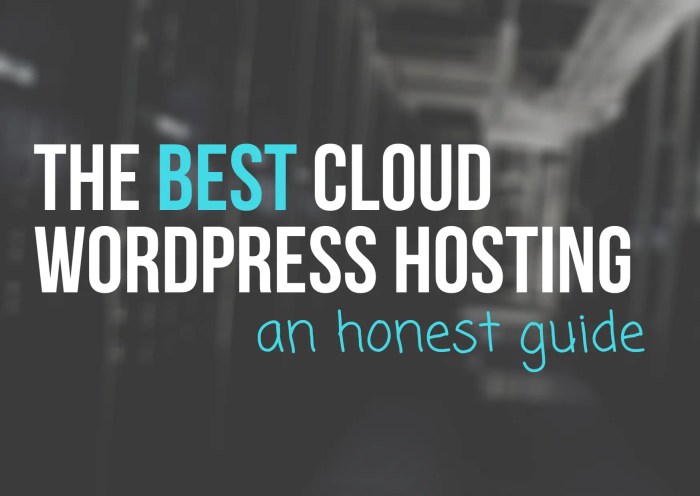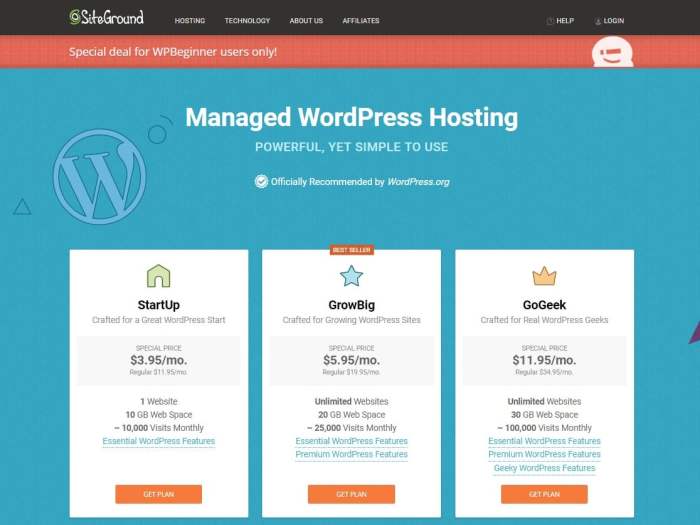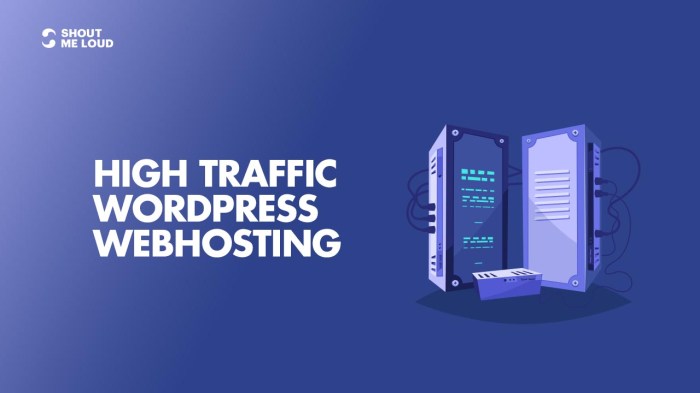Best cloud hosting for WordPress websites with high traffic is a crucial consideration for any website owner looking to achieve peak performance and scalability. As your website grows and attracts more visitors, the demand for resources increases exponentially. Traditional shared hosting plans often struggle to keep up with this surge, leading to slow loading times, frequent downtime, and ultimately, a negative user experience.
Cloud hosting emerges as the ideal solution, offering a flexible and robust infrastructure designed to handle even the most demanding traffic spikes.
Cloud hosting provides a distributed network of servers that work together to distribute the workload. This means that your website is not reliant on a single server, ensuring high availability and resilience. Furthermore, cloud platforms offer features like automatic scaling, allowing your website to adapt to changing traffic patterns seamlessly.
This means that your website can handle sudden surges in traffic without compromising performance.
Understanding High-Traffic WordPress Hosting Needs

Hosting a high-traffic WordPress website presents unique challenges that require careful consideration. Unlike websites with moderate traffic, high-traffic sites experience significantly higher demands on resources, putting pressure on the hosting infrastructure. Choosing the right hosting solution is crucial for ensuring optimal performance, reliability, and security for your website.
Identifying High Traffic
It’s essential to understand the indicators that signal a website is experiencing high traffic. These metrics provide valuable insights into the website’s performance and help determine if the current hosting plan is sufficient.Here are some key indicators of high traffic:
- High Page Views:A significant number of page views per day or month indicates a large user base actively engaging with the website’s content.
- High Bandwidth Usage:Bandwidth refers to the amount of data transferred between the website and users. High bandwidth usage is a clear sign of heavy traffic, as users download large amounts of data, including images, videos, and other website assets.
- High CPU Usage:The CPU (Central Processing Unit) is responsible for processing website requests. High CPU usage suggests that the website is under heavy load and the hosting server is struggling to handle the requests efficiently.
- Slow Page Load Times:Slow page load times are a common symptom of high traffic. When a server is overloaded, it can take longer to process requests, leading to slower page load times for users.
- Frequent Website Downtime:High traffic can overwhelm a hosting server’s resources, leading to downtime. A website that frequently experiences downtime due to high traffic indicates an inadequate hosting plan.
Consequences of Inadequate Hosting for High-Traffic Sites
Choosing inadequate hosting for a high-traffic WordPress website can lead to several negative consequences, impacting the user experience, performance, and overall website success.
- Slow Page Load Times:Slow page load times are a major user experience issue. Users are impatient and will quickly abandon a website that takes too long to load. This can lead to a decline in user engagement, conversions, and overall website traffic.
- Website Downtime:Website downtime occurs when a server is unable to respond to user requests, making the website inaccessible. Downtime can result in lost revenue, damage to the website’s reputation, and decreased search engine rankings.
- Security Vulnerabilities:Shared hosting environments can pose security risks, as multiple websites share the same server resources. This increases the vulnerability to attacks and compromises, potentially exposing sensitive data and affecting website security.
- Limited Scalability:Shared hosting plans often have limited scalability options, making it difficult to accommodate traffic surges. This can lead to performance issues and downtime when the website experiences unexpected spikes in traffic.
Key Features of Cloud Hosting for High-Traffic WordPress

Cloud hosting offers a superior solution for high-traffic WordPress websites compared to traditional shared hosting. It provides the scalability, performance, and security needed to handle the demands of a large audience and ensure a smooth user experience.
Scalability
Scalability is a crucial feature for high-traffic WordPress websites, as it allows the website to handle increasing traffic and user demands without experiencing performance issues. Cloud hosting provides a flexible and dynamic environment where resources can be easily scaled up or down based on website traffic.
Unlike shared hosting, where resources are limited and shared among multiple websites, cloud hosting offers dedicated resources that can be adjusted on demand. For instance, during peak traffic hours, a cloud hosting provider can automatically allocate additional server resources to ensure smooth website performance.
This dynamic allocation of resources ensures that your website remains responsive and fast, even during traffic spikes.
Security
Security is paramount for any website, especially those with high traffic. Cloud hosting offers enhanced security features compared to shared hosting, safeguarding your website from various threats. Cloud providers implement robust security measures, including firewalls, intrusion detection systems, and regular security updates.
These measures protect your website from malicious attacks, data breaches, and other security vulnerabilities. Additionally, cloud hosting providers often offer advanced security features such as DDoS protection, which can effectively mitigate distributed denial-of-service attacks that aim to overwhelm a website with traffic.
Performance
Performance is crucial for high-traffic WordPress websites, as slow loading times can lead to user frustration and abandonment. Cloud hosting offers superior performance compared to shared hosting, providing faster loading speeds and improved user experience. Cloud hosting utilizes a network of interconnected servers, allowing your website to be distributed across multiple servers, which reduces the load on any single server and improves overall performance.
This distributed architecture also enhances website availability, as one server failure will not affect the entire website. Additionally, cloud hosting offers features like content delivery networks (CDNs), which cache website content closer to users, further reducing loading times and improving performance.
Reliability
High-traffic websites require high availability and reliability to ensure a consistent user experience. Cloud hosting excels in reliability, offering a robust infrastructure that minimizes downtime and ensures website uptime. Cloud providers utilize redundant systems and automatic failover mechanisms, which ensure that your website remains accessible even if one server fails.
This redundancy and automatic failover capability ensure that your website remains online and accessible to users, minimizing downtime and ensuring a consistent user experience.
Cost-Effectiveness, Best cloud hosting for WordPress websites with high traffic
Cloud hosting can be a cost-effective solution for high-traffic WordPress websites, especially when compared to dedicated servers. While dedicated servers offer high performance and resources, they can be expensive, especially for websites with fluctuating traffic. Cloud hosting allows you to pay only for the resources you use, making it a more cost-effective option for websites with varying traffic patterns.
You can scale your resources up or down as needed, ensuring that you are not paying for resources you are not using. This pay-as-you-go model can significantly reduce hosting costs, especially for websites with unpredictable traffic fluctuations.
Top Cloud Hosting Providers for High-Traffic WordPress: Best Cloud Hosting For WordPress Websites With High Traffic

Choosing the right cloud hosting provider is crucial for ensuring your high-traffic WordPress website runs smoothly and delivers a seamless user experience. Several providers offer specialized features and robust infrastructure to cater to the demanding needs of high-traffic websites.
Cloud Hosting Providers for High-Traffic WordPress
The following table compares some of the leading cloud hosting providers for WordPress, highlighting their pricing plans, key features, and pros and cons:
| Provider Name | Pricing Plans | Key Features | Pros & Cons |
|---|---|---|---|
| AWS (Amazon Web Services) | Pay-as-you-go pricing based on resource usage |
|
|
| Google Cloud Platform (GCP) | Pay-as-you-go pricing based on resource usage |
|
|
| Microsoft Azure | Flexible pricing models, including pay-as-you-go and reserved instances |
|
|
| DigitalOcean | Fixed monthly pricing plans based on resources |
|
|
| Linode | Fixed monthly pricing plans based on resources |
|
|
| SiteGround | Fixed monthly pricing plans based on resources |
|
|
Essential Considerations for Choosing a Cloud Hosting Provider

Selecting the right cloud hosting provider is crucial for high-traffic WordPress websites. It’s not just about finding the cheapest option, but about finding a provider that can meet your specific needs and ensure your website’s performance, security, and scalability.
Website Traffic Volume and Resource Requirements
Before choosing a provider, you need to understand the volume of traffic your website receives and the resources it requires. Factors to consider include:
- Average daily visitors: This gives you an idea of the number of users accessing your website on a typical day.
- Peak traffic periods: Consider times when you anticipate surges in traffic, such as during sales or promotions.
- Website content: Heavy content like videos and high-resolution images demand more resources than text-based websites.
- Plugin usage: Some WordPress plugins can be resource-intensive, impacting your website’s performance.
Budget
Cloud hosting providers offer a wide range of pricing plans. It’s essential to understand your budget constraints and find a plan that aligns with your needs without breaking the bank.
- Cost per month: Compare the monthly costs of different providers and their plans to determine the most affordable option.
- Scalability options: Choose a provider that allows you to scale your plan as your website grows, without significant price jumps.
- Additional costs: Consider potential costs like domain registration, SSL certificates, and backups.
Technical Expertise
Your level of technical expertise will influence your choice of provider.
- Server management: Some providers offer managed hosting, where they handle server administration tasks, while others require you to manage your own servers.
- Technical support: Assess the level of technical support offered by different providers, including response times and availability.
- Security measures: Choose a provider that offers robust security features like firewalls, malware protection, and regular security updates.
Checklist of Questions for Cloud Hosting Providers
Before making a decision, ask potential providers these questions to ensure they meet your specific needs:
- What are your server locations and data centers?This helps determine latency and data transfer speeds for your target audience.
- What security measures do you offer?Inquire about firewalls, malware protection, and data encryption protocols.
- What level of technical support do you provide?Understand response times, availability, and the type of support offered (e.g., phone, email, chat).
- Do you offer managed hosting?If you prefer not to manage server administration tasks, ask about managed hosting options.
- What are your scalability options?Inquire about how you can scale your plan as your website grows and the associated costs.
- Do you offer any performance optimization tools?Look for providers that offer caching, content delivery networks (CDNs), and other performance-enhancing features.
- What are your backup and recovery procedures?Understand how frequently backups are performed and how data is restored in case of an outage.
- What is your uptime guarantee?A high uptime guarantee ensures your website is accessible to visitors most of the time.
Evaluating and Selecting the Best Cloud Hosting Provider
Once you’ve gathered information from potential providers, follow these steps to evaluate and select the best option:
- Compare pricing plans: Analyze the costs of different providers and their plans to find the most affordable option that meets your needs.
- Assess features and resources: Compare the features and resources offered by each provider, such as storage space, bandwidth, and security measures.
- Read reviews and testimonials: Look for reviews and testimonials from other users to get insights into the provider’s reliability, performance, and customer support.
- Consider customer support: Evaluate the level of technical support offered, including response times, availability, and the type of support provided.
- Test the provider’s performance: If possible, consider using a free trial or test account to assess the provider’s performance and reliability.
Ultimate Conclusion

Choosing the right cloud hosting provider for your high-traffic WordPress website is a critical decision. By carefully considering factors like traffic volume, resource requirements, budget, and technical expertise, you can find a provider that aligns with your specific needs.
Remember to explore the features offered by each provider, their performance track record, and customer support reputation. With the right cloud hosting solution, your website can thrive, delivering a seamless experience to your visitors and driving your online success.